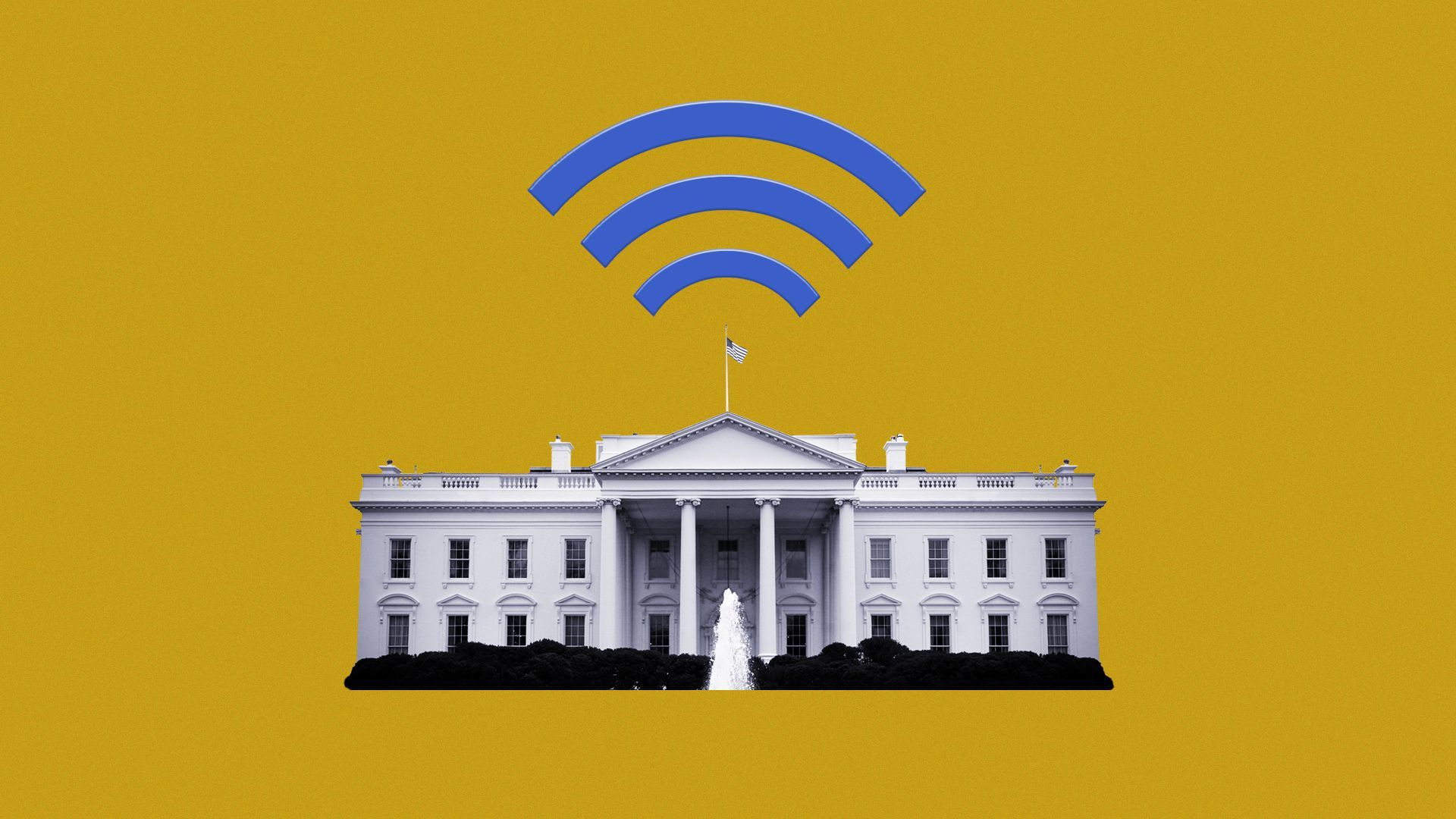| | | | | | | Presented By TechNet | | | | Axios Login | | By Ina Fried · May 09, 2022 | | So the Mac was out of memory and I wanted to restart and so I forced a restart ... or I thought I did. I looked back a half hour later and there was a message that basically said "Safari said no." I'm like wait, I can say restart and Safari can veto me? 📉 Situational awareness: Bitcoin plummets to below $33,000, its lowest price since July 2021. Today's newsletter is 1,170 words, a 4-minute read. | | | | | | 1 big thing: Cheat sheet for the next tech downturn |  | | | Illustration: Sarah Grillo/Axios | | | | A lasting market downturn is unlikely to knock the tech industry from its perch at the top of American business, but it would reshape the tech world's dynamics in profound ways, Axios' Scott Rosenberg writes. Driving the news: The last big recession to hit Silicon Valley bottomed out 20 years ago, and last week's stock market carnage has tech's leaders and foot soldiers digging through their memory banks to remember what that feels like. Here's a cheat sheet for them and you: The big companies will be just fine, thanks to enormous financial cushions. - Big piles of cash would give Apple (roughly $200 billion), Google/Alphabet ($169 billion) and Microsoft ($105 billion) even greater power during a downturn, when stock value ebbs and dollars are king.
- Amazon ($86 billion) has plenty of cash, too, but is more exposed to the immediate ebb and flow of consumer demand.
- Facebook/Meta ($44 billion) has less cash and less room to maneuver, but the company shows no sign of scaling back heavy investment in its long-term strategy to build a metaverse.
Smaller companies with business plans that involve burning venture capital to seize market share will scramble. In a recession: - Frothy investment fads — think meme stocks, NFTs and flavor-of-the-week startup ideas — would likely fade in appeal, at least for a while.
- Big firms typically go on buying sprees — but the current antitrust climate could put a damper on that.
- Lots of companies will rewrite their plans around business-to-business concepts, which often promise a steadier income than consumer-aimed efforts.
- Everyone will be keeping their eyes peeled for what the next platform will be, since next platforms have tended to emerge during recessions in the past.
Yes, but: The industry has been operating for so long without any major setbacks that this time it didn't wait for the economy to sputter before kicking off the next-platform hunt. What to watch: - Traditionally, recessions have meant companies have less trouble retaining key talent, since competition for employees dwindles and people are happier just to have jobs. But in the era of the Great Resignation and in an industry that's made many of its employees wealthy, that might not hold this time around.
- The dotcom bust seemed to be fading into the rearview mirror when 9/11 hit and extended that downturn by roughly another year. Geopolitical shocks can interact with slow markets in nasty ways, and the current world situation looks like it will provide plenty of that kind of scenario.
Be smart: The market could roar back next week, and even if it doesn't, a lot of smart people don't see a recession in the near term. But the better you know what one looks like, the sooner you'll be able to recognize one is happening. |     | | | | | | 2. Biden touts "free" internet service plans |  | | | Illustration: Rae Cook/Axios | | | | The White House said Monday 20 internet service providers have agreed to offer $30 high-speed internet plans to low-income families, effectively giving free service to households that qualify for a federal subsidy, Axios' Margaret Harding McGill reports. Why it matters: Cost is a key factor in the digital divide between those who have internet service and those who do not. Catch up quick: The Affordable Connectivity Program (ACP) provides a $30 monthly discount on internet service from participating providers for low-income households, such as those that receive federal assistance through SNAP or Medicaid. Driving the news: President Biden and Vice President Kamala Harris will tout the agreement with providers — which includes Verizon, Comcast and Charter — at an event Monday focused on the ACP. - On a call with reporters, senior administration officials said the administration worked with 20 program providers to either increase the service speed or decrease the price to reach plans that offer 100 Mbps service for $30 a month.
What they're saying: "Eligible families who choose to apply their ACP benefit to one of these plans will get high-speed internet at no monthly cost," a senior administration official said. What's next: The White House is launching a website, GetInternet.gov, and reaching out to eligible households through federal agencies to encourage enrollment. - As many as 48 million households qualify for the program, a senior administration official said. So far, just over 11.5 million have signed up.
|     | | | | | | 3. Congress urged to ease green card rules | | More than four dozen former national security leaders are calling on Congress to exempt international advanced technical degree holders from green card caps in a bid to maintain U.S. science and tech leadership, especially over China, according to a copy of a letter viewed by Axios, Bethany Allen-Ebrahimian reports. Context: China competition bills passed in the last year by the House and Senate seek to pour money into the National Science Foundation and other federal research agencies. They also seek to incentivize tech companies, especially those that manufacture semiconductors, to build facilities in the U.S. - Current U.S. immigration law limits the number of green cards issued per country, and people from populous countries like India and China are disproportionately affected.
What's happening: The Bipartisan Innovation Act Conference Committee is expected to begin this month to try to reconcile the House and Senate bills. - Signatories of the letter, dated May 9, include former Secretary of Homeland Security Michael Chertoff, former Secretary of Energy Steven Chu and 47 others.
Read the whole story. |     | | | | | | A message from TechNet | | Nat Sec leaders warn against undermining America's tech advantage | | |  | | | | National security experts urge Congress to: "[C]onduct a review of any legislation that could hinder America's key technology companies in the fight against cyber and national security risks emanating from Russia's and China's growing digital authoritarianism." Read the letter. | | | | | | 4. Musk's goals for Twitter are beyond ambitious |  | | | Photo illustration: Sarah Grillo/Axios. Photo: Britta Pedersen-Pool/Getty Images | | | | Elon Musk envisions a Twitter that can more than quadruple its revenue and user base by 2028, while cutting its dependence on advertising, the New York Times reported on Friday, citing a leaked slide deck. Why it matters: The documents show that Musk imagines himself able to produce financial growth unlike any the company has seen in its history. By the numbers: Here are Musk's targets, per the Times... - Boost annual revenue to $26.4 billion by 2028, compared to $5 billion last year.
- Get to nearly 1 billion users. Musk's goal is 600 million users by 2025, up from 217 million last year, and 931 million by 2028.
- Cut the percentage of revenue from ads to 50%. (Ads were about 90 percent of revenue in 2020, the Times notes.)
- Boost paid subscriptions, including growing Twitter Blue (currently $3 per month) to 69 million paying users by 2025 and 159 million by 2028.
Catch up quick: The Twitter purchase is a financial stretch even for the world's richest man. Yes, but: Both Musk and pitch decks are known for making overly rosy predictions. |     | | | | | | 5. Take note | | Trading Places - Ian Goodfellow, a director on Apple's machine learning team, is leaving the company over the company's insistence that workers come into the office, per The Verge's Zoë Schiffer.
ICYMI - A federal judge on Friday dismissed former President Trump's lawsuit against Twitter. (Axios)
|     | | | | | | 6. After you Login | | Until today, I never knew the internet has live stats. |     | | | | | | A message from TechNet | | National security leaders warn Congress | | |  | | | | National security experts urge Congress to: "[C]onduct a review of any legislation that could hinder America's key technology companies in the fight against cyber and national security risks emanating from Russia's and China's growing digital authoritarianism." Read the letter. | | |  | It's called Smart Brevity®. Over 200 orgs use it — in a tool called Axios HQ — to drive productivity with clearer workplace communications. | | | | | | Axios thanks our partners for supporting our newsletters. If you're interested in advertising, learn more here.
Sponsorship has no influence on editorial content. Axios, 3100 Clarendon Blvd, Suite 1300, Arlington VA 22201 | | | You received this email because you signed up for newsletters from Axios.
Change your preferences or unsubscribe here. | | | Was this email forwarded to you?
Sign up now to get Axios in your inbox. | | | | Follow Axios on social media:    | | | | | |
No comments:
Post a Comment